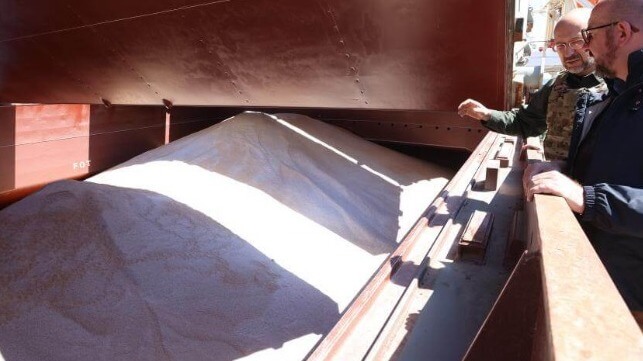IRC: Russian Blockade of Ukrainian Grain Will Have Deadly Consequences

The Russian blockade of Ukrainian food exports in the Black Sea is set to have deadly consequences for hunger-stricken countries where over 800 million people are grappling with food insecurity, global humanitarian NGO International Rescue Committee (IRC) has warned.
The warning comes at a time when disagreements have emerged between Ukraine and Africa over grain and wheat exports over the blockade, which has ignited an unprecedented surge in food prices - and threatens to unleash famine on the continent. Ukraine Foreign Affairs spokesperson Oleg Nikolenko has blasted the African Union for seemingly siding with Russia by pushing Kyiv to remove mines in its waters.
This came after the chairman of the African Union, Senegalese President Macky Sall, met Russian President Vladimir Putin in Sochi on June 3, where the two leaders discussed mechanisms to facilitate grain exports to Africa to ease the worsening problem of food insecurity.
During the meeting, Russia demanded that Ukraine must clear mines in the Black Sea port of Odessa to facilitate shipping of grain. Ukraine, however, has remained adamant that Russia intends to “take advantage of the demining” to stage an attack on the strategic seaport.
"We call on President Macky Sall and the African Union to use their leverage on Russia to convince it to stop its senseless hostilities. Ending the war will allow 22 million tonnes of grains stuck in the sea ports to be unblocked and avert food crises in Africa and beyond," said Nikolenko in a statement on his Facebook account.
He added that Ukraine has proposed a three-point plan that will enable the unblocking of its sea ports in order to resume grain exports. The plan centers on Russia’s withdrawing its naval forces in the Black Sea and the Sea of Azov; military equipment being provided to protect Ukraine’s southern coastline in case Russia decides to take advantage of the demining; and an international navy mission being launched to patrol the export routes.
“The Russian army is destroying critical agricultural infrastructure, blocking Ukraine’s sea ports and grain terminals and launching missile attacks on Ukraine’s southern agricultural regions. Russia also steals grain from the Ukrainian territories it has seized by force,” added Nikolenko.
The grain and wheat exports standoff comes even as IRC is raising the red flag that the ongoing blockade of exports at the Black Sea ports of Ukraine is having dire impacts for regions like East Africa, which are already facing severe food insecurity. The NGO contends that without action, countries like Somalia, Kenya and Ethiopia will face famine, considering they depend on Russia and Ukraine for 90 percent of their wheat and are already facing a record drought.
AWith Ukraine producing a substantial share of the world's wheat exports, food prices worldwide have already skyrocketed by 41 percent and an additional 47 million people are projected to experience acute hunger this year. Fertilizer prices surged in March, up nearly 20 percent since January 2022 and almost three times higher compared to a year ago.
“Blockades on ports in the Black Sea are holding thousands of tonnes of wheat, grain and fertilizer hostage with devastating consequences for millions already caught in growing hunger crises worldwide. These blockades must be lifted immediately,” said David Miliband, IRC President & CEO.
He added that in places like Ethiopia, where 8.6 million are going hungry as the region is pushed into a catastrophic hunger crisis, the UN humanitarian appeals remain less than one-third funded.
IRC said that as international attention continues to focus on the Russia-Ukraine war, there is a risk of funding and attention being diverted from the growing hunger crisis. Taken together, the related response plans need an additional $10 billion in funding from the international community.

that matters most
Get the latest maritime news delivered to your inbox daily.
The NGO noted that the conflict is having far reaching implications for people living in conflict-affected regions. The Sahel region of West Africa, including Burkina Faso, Mali and Niger, is seeing the highest level of food insecurity since 2014, with 18 million people facing food insecurity and more than seven million children malnourished.
Yemen, which has been enduring a devastating war for the past seven years, relies on Russia and Ukraine for almost half of its grain imports; Lebanon, which is experiencing a severe economic crisis, imports 80 percent of its wheat from the region.
